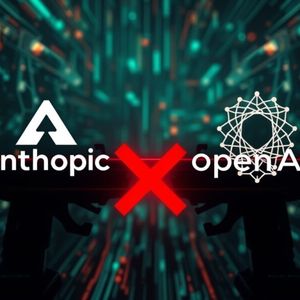BitcoinWorld Anthropic’s Bold Move: Revoking OpenAI’s Claude AI Access In the fast-evolving landscape of artificial intelligence, where innovation and rivalry often go hand-in-hand, a significant development has sent ripples across the industry. Leading AI firm Anthropic has made a decisive move, reportedly revoking access for its competitor, OpenAI , to its advanced Claude AI models. This action, stemming from alleged violations of Anthropic’s terms of service, highlights the intensifying AI competition and raises crucial questions about data usage, proprietary technology, and the future trajectory of foundational AI models like GPT-5 . What Sparked the Dispute? Unpacking Anthropic’s Stance The core of this escalating dispute, as reported by Wired, centers on how OpenAI was allegedly utilizing Anthropic’s Claude AI models. Sources indicate that OpenAI had been integrating Claude into its internal tools. This integration reportedly allowed OpenAI to benchmark Claude’s performance against its own proprietary models across various critical categories, including coding, writing, and safety protocols. For Anthropic , this was a direct breach of their commercial terms, which explicitly prohibit companies from leveraging Claude to develop competing services. An Anthropic spokesperson elaborated on their position, stating, “OpenAI’s own technical staff were also using our coding tools ahead of the launch of GPT-5 .” This particular detail suggests a strategic move by OpenAI to gain insights into a rival’s capabilities, potentially informing the development of their next-generation model. Such competitive intelligence gathering, while common in many industries, crosses a line when it violates contractual agreements designed to protect intellectual property and market advantage. OpenAI’s Response: A Glimpse into the Future of AI Competition In response to Anthropic’s decision, an OpenAI spokesperson expressed disappointment, noting, “While we respect Anthropic’s decision to cut off our API access, it’s disappointing considering our API remains available to them.” This statement underscores the complex dynamics of the AI ecosystem, where companies are both competitors and, at times, reluctant collaborators through API access. OpenAI’s sentiment suggests a desire for continued reciprocal access, perhaps for their own benchmarking or research purposes, even as they develop their own powerful models. This incident is not an isolated one in the history of AI competition . It echoes previous instances where Anthropic has shown reluctance to provide access to competitors. Chief Science Officer Jared Kaplan previously justified cutting off Windsurf (a rumored OpenAI acquisition target, later acquired by Cognition) by remarking, “I think it would be odd for us to be selling Claude to OpenAI.” This consistent stance highlights Anthropic’s commitment to protecting its technological edge and preventing direct competitive exploitation of its models. The Core of the Conflict: Terms of Service and the Race for GPT-5 The crux of the matter lies in the delicate balance between open innovation and proprietary protection. While many AI companies offer API access to foster development and expand their reach, they also embed strict terms of service to prevent misuse, especially by direct competitors. Anthropic’s terms are clear: using Claude AI to build competing services is forbidden. OpenAI’s alleged actions, particularly in the context of their impending GPT-5 launch, appear to have directly contravened these terms. This situation brings to light several critical aspects: Proprietary Technology vs. Open Access: The tension between making powerful AI models accessible via API and safeguarding core intellectual property from competitive exploitation. Benchmarking Ethics: The ethical boundaries of using a competitor’s product for internal benchmarking, especially when it might inform the development of a directly competing product. The Race for Next-Gen Models: The fierce urgency among leading AI labs to develop and launch superior models like GPT-5 , driving intense competitive behavior. This incident serves as a stark reminder that as AI capabilities advance, so too will the complexities of business relationships, legal frameworks, and ethical considerations within the industry. Implications for the AI Landscape: What’s Next for Claude AI and OpenAI? The immediate consequence is a potential reduction in data points for OpenAI’s internal comparisons, which might slightly impact their development insights. However, the broader implications extend beyond just these two companies. This dispute sets a precedent for how major AI players might interact and protect their innovations going forward. It could lead to: Stricter API Terms: Other AI providers might review and tighten their API access terms to prevent similar situations. Increased Internal Development: Companies might invest more heavily in developing their own comprehensive internal benchmarking tools and less on relying on competitor APIs. Consolidation or Divergence: The industry could see further consolidation through acquisitions (like Cognition acquiring Windsurf) or a more pronounced divergence, with companies building walled gardens around their unique AI capabilities. For developers and businesses relying on these powerful models, such disputes highlight the importance of understanding the underlying terms of service and diversifying their AI toolchains to mitigate risks associated with sudden access revocations. Conclusion: A New Chapter in AI Competition The decision by Anthropic to revoke OpenAI ‘s access to its Claude AI models marks a pivotal moment in the ongoing AI competition . It underscores the intense rivalry driving innovation in the sector and the lengths to which companies will go to protect their competitive advantages. As the race to develop increasingly sophisticated models like GPT-5 accelerates, we can expect more such strategic maneuvers and legal skirmishes. This incident serves as a powerful reminder that the future of AI is not just about technological breakthroughs, but also about the complex interplay of business strategy, intellectual property, and ethical conduct. The AI landscape is maturing, and with that maturity comes a heightened awareness of commercial realities and competitive boundaries. To learn more about the latest AI market trends, explore our article on key developments shaping AI models’ future features. This post Anthropic’s Bold Move: Revoking OpenAI’s Claude AI Access first appeared on BitcoinWorld and is written by Editorial Team















